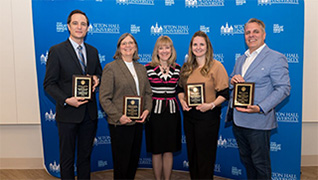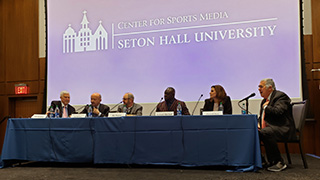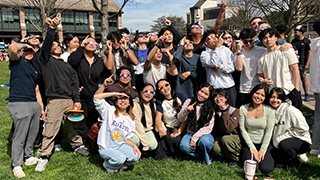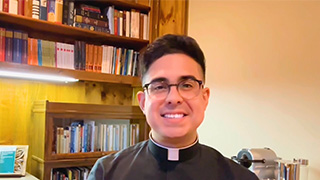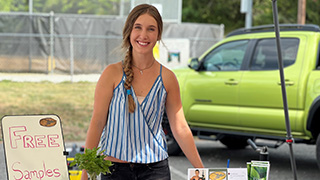Contact Tracing and Promoting Health and Safety
Thursday, September 2, 2021
Yesterday's rain, wind and flooding brought tremendous destruction to the region. We hope and pray you and your families are well. We are providing regular updates about campus operations affected by the storm through separate communications.
COVID-19 statistics continue to show mixed signals. Cases continue to rise, as do vaccination levels. The transmission rate continues its steady decline. You can read more at Track COVID-19 in New Jersey: Maps, graphics, regular updates.
The HICT continues to closely monitor government guidance and public statistics, refining safety protocols to address the changing health environment.
Indoor Mask Requirement
All individuals (vaccinated and unvaccinated) are required to wear a mask at all indoor, nonresidential, on-campus University settings, except when alone or dining.
The CDC provides valuable guidance regarding mask wear and care: Your Guide to Masks and Wearing a Mask.
Contact Tracing
We provide, as a reminder, some important information from the CDC about the contact tracing process:
- For COVID-19, a close contact is anyone who was within 6 feet of an infected person for a total of 15 minutes or more. An infected person can spread COVID-19 starting from 48 hours (or 2 days) before the person has any symptoms or tests positive for COVID-19. A person is still considered a close contact even if they were wearing a mask while they were around someone with COVID-19.
- If you think you may have COVID-19 and are waiting for a COVID-19 test result, stay home and monitor your health to protect your friends, family and others from possibly getting COVID-19.
- If you are diagnosed with COVID-19
- Stay home and away from others except to get medical care.
- Monitor your health.
- Cooperate fully and honestly with your contact tracer
We encourage you to learn more at the following CDC pages:
Seton Hall Contact Tracing
We continue to conduct comprehensive contact tracing in coordination with local health officials. The University's contact tracing protocols remain in place from last year.
Any student who tests positive for COVID-19, vaccinated or unvaccinated, should be immediately referred to Health Services (973-761-9175). The protocol for students testing positive is:
- The student is advised to isolate for 10 days. Resident students will isolate in a separate residence hall.
- Health Services will begin contact tracing by following the guidelines from the CDC and the local health department. This includes the identification of any close contacts in any academic settings.
- Close contacts will be notified by designated University personnel and advised to quarantine and get tested as appropriate based upon their vaccine and symptom conditions.
- Please note that it is not necessary for any class to be moved to remote instruction unless advised by the Academic Dean or Office of the Provost.
Students who must isolate or quarantine due to COVID-19 related reasons are advised to notify the Dean of Students to help us provide the standard notification. This “Class Absence” notice informs professors that a student will be absent for a period of time due to medical reasons.
You can learn more about testing availability at: How To Get Tested For COVID-19 In New Jersey.
University Actions to Promote Your Health and Safety
In alignment with CDC and NJ Department of Health guidance, we continue to implement numerous health and safety protocols that align with or exceed the guidelines for a fully vaccinated campus.
In addition to the items in the link above:
- The cafeteria has returned to normal operations. Tables and serving areas are monitored and wiped down. All GDS employees are masked. Restrooms are receiving added cleaning and attention. Dining areas passed all South Orange health inspections.
- Hand sanitizer stations are regularly refreshed, particularly at the entrance to dining areas.
- Each resident student received a welcome kit at Move In, including hand sanitizer.
- There are a very limited number of remote learning rooms in Schwartz for students. Students can contact [email protected] to reserve a space during business hours. The libraries also provide resources.
Recent Public Health Developments
The Food and Drug Administration gave full approval to Pfizer's COVID-19 vaccine. We are no longer offering individuals the option to claim a personal exemption.
Vaccines are free, widely available, and effective. Additionally, vaccinated individuals appear to have an extremely low probability of becoming seriously ill or worse.
- Covid Vaccine Finder
- Essex County Mobile Health Clinic – September 7
- On-Campus Flu and COVID-19 Vaccine Clinic – September 28 (details forthcoming)
Response Rate to Confidential Vaccine Declaration at 98% Across Entire University
- 99.6% of full-time faculty have declared their vaccination status.
- 97.5% of staff and administrators have declared their vaccination status.
- 98% of current and incoming students have declared their vaccination status.
- 98.1% of adjunct faculty who have fall 2021 semester assignments have declared their vaccination status.
University Vaccination Levels Exceed Revised State of New Jersey Goal Levels
Through the Confidential Vaccine Declaration (CVD), current Seton Hall data are indicating that fall 2021 vaccination rates are near 89.1% for students (92.5% of those are fully vaccinated), 92.8% for staff and administrators (96.5% of those are fully vaccinated), 95.8% for faculty (99% of those are fully vaccinated), and 93.7% for adjunct faculty (97% of those are fully vaccinated). These percentages are well above the NJ and national rates.
There are numerous benefits to getting vaccinated.
Copying and Uploading Vaccine Information
All members of the community should carry their vaccination cards and/or take a picture of them with their mobile phones.
Students should upload their vaccination cards on the student Health Portal.
New Jersey residents can download and use the State-supported Docket app, which provides digital access to COVID-19 immunization records.
Remaining Vigilant and Prepared
While we do not know what circumstances the virus will throw at us next, we remain prepared. Our environmental health and safety protocols – created in consultation with numerous health and higher education experts – enable us to adapt to the rapidly changing situation. We remain in contact with local, state, and national health officials.
Your health and safety remain paramount in Seton Hall's planning and actions. If you have questions, comments, or suggestions, please contact the HICT here.
Sincerely,
Matthew Borowick
Vice President of University Relations
Co-chair, Health Intervention and Communication Team
Monica N. Burnette, Ph.D.
Interim Vice President, Division of Student Services
Co-chair, Health Intervention and Communication Team
Categories: Health and Medicine

